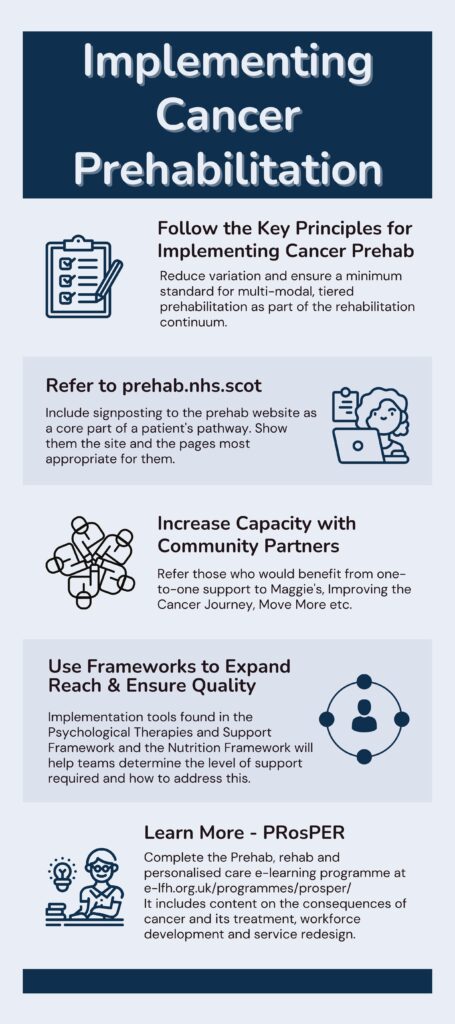Cancer prehabilitation can be defined as:
“a process on the cancer continuum of care that occurs between the time of cancer diagnosis and the beginning of acute treatment and includes physical and psychological assessments that establish a baseline functional level, identify impairments, and provide interventions that promote physical and psychological health to reduce the incidence and/or severity of future impairments.”
Silver et al. CA Cancer J Clin, 2013.
Evidence has shown that cancer prehabilitation can yield the following benefits;
- Better response to treatment
- Quicker recovery
- Reduced incidence and severity of treatment side effects
- Reduced risk of post-operative complications
- Reduced anxiety and improved mood
- Improved energy levels
- Patients take an active role in their cancer care
- Lower chance of cancer recurrence
- Improves general fitness and can lessen severity of other health conditions
- Improves ability for patient to fulfil normal activities of daily living
- Greater sense of empowerment over their treatment experience
As such, cancer prehabilitation, as a component of rehabilitation, should underpin the whole cancer pathway and is an approach we seek for all patients with cancer in Scotland.
___________________________________________________________________________
Implementing cancer prehabilitation
Insights form those with a lived experience of cancer
The Health and Social Care Alliance Scotland (the ALLIANCE) were commissioned by the Scottish Government and it’s Cancer Prehabilitation Implementation Steering Group to conduct a series of focus groups. The groups would inform the design and delivery of cancer prehabilitation services in Scotland. A report detailing the findings of the focus groups has been produced and it includes a series of recommendations. The Cancer Prehabilitation Implementation Steering Group (CPISG) has welcomed these recommendations and would encourage anyone who is developing a prehabilitation service to consider their role in implementing these recommendations. The CPISG has also set out how they are responding to these in a formal reply:
Cancer prehabilitation focus groups: Insights report
Cancer Prehabilitation Implementation Steering Group response to the ALLIANCE’s focus group recommendations
Reducing variation
To address unwarranted variation and ensure quality of care a series of resources have be created to support the sustained development and implementation of cancer prehabilitation across Scotland.
Resources:
- Key Principles for Implementing Cancer Prehabilitation across Scotland
- Psychological Therapies and Support Framework for People Affected by Cancer
- Nutrition Framework for People with Cancer
The image opposite explains how these resources can be used alongside this website and e-learning opportunities to improve service provision.
Further resources and training opportunities
Finally, the PRosPer programme which can be found under the ‘Education and Training‘ tab includes a toolkit to support service development and evaluation.

Insights from established services
From Theory to Practice: An International Approach to Establishing Prehabilitation Programmes (external link), published in Current Anesthesiology Reports in February 2022 also gives suggestions on implementation based on experiences from three countries.
